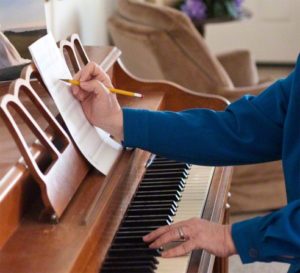
© www.churchofjesuschrist.org
How does a person become a composer? What are the attributes you need to write music? Can music composition be taught, and perhaps more importantly, can it be learned?
As many universities and schools around the world already teach music composition, you might think I’m soft in the head for asking a question that has already been answered. Yet, so many composers have never had a lesson, but they create great music. However, this doesn’t mean that they were not self-taught.
Composers who learn their craft at universities and the self-taught ones cannot be separated when it comes to their music. Sir Edward Elgar, who thought of himself as an outsider in his country of England, largely taught himself. Elgar’s Enigma Variations are some of the most cherished music in the world. In particular, variation number nine, titled Nimrod, which can mean several things, however, this transcendental music means something special to many people. It is not an unpopular piece for funerals for obvious reasons.
My questions go to the heart of composition. Some of the elements of music are rhythm, melody and harmony. Yet, it is possible for someone to create all these attributes in music without ever having a lesson. Most musical characteristics can be created without even being able to play an instrument. You can do this in your mind or by singing or humming.
Even without one lesson, a person can sit at a piano and create music. While it might not be of the sophisticated kind, most people would recognise an untrained composer’s work as music. The reason I put forward for this suggestion is that not one of us is unmusical.
I’m not saying that music is built within us, I’m saying that through the simple process of listening, we are all musical; we are all composers.
Music is about movement, and for most of us, we know how to move. Sound is created when something vibrates. Music is created when you put the elements as mentioned together. Yet, music can be almost static and still be music. One of my favourite online radio stations is Ambient Art Sound. Almost everything they play has no melody or rhythm, but if you listen to it, I bet you recognise the sounds as music.
Someone sat down and composed this music. They thought about it; they edited it and most likely produced it. Many ambient composers do not rely upon schooling or academic training to create music; it’s all about feel. No one can say with any factual evidence that ambient music is not as good as the great classical music of the world, because it is fit for a purpose, just like classical music is.
Music composition is not about what you learn or how you apply it. Music composition comes from within a human being. Just the same way we all look different, everyone can create original music.
The trained composer can make music that fits certain styles, and they will probably be recognised as a talented composer because we are familiar with that compositional style. The untrained composer, like I was when I first started writing music, is all about creating the best sound, whether or not it fits a style or genre.
I bought my first piano in my teens and just started hammering away, but I did it through the lens of listening to music for years. I made my music sound like the compositions I had been listening to, at least I thought so. I did not know about chord progression, harmony or voice leading, which is the process that governs the progression of melodic lines and how they connect to harmonic elements.
The type of music I was making can be called improvisational. It had no home; it didn’t fit most music styles, and I know it annoyed my father. But I learnt so much about music from not taking music lessons and just improvising; the act of improvisation taught me how to hear.
When I did begin my first piano lessons, the music I created then started sounding like the music I was learning to play. It had a form, a style, and it was more pleasing to my father.
Not all composers need to or should go to college. Anyone can create music if the drive is in them. Anyone can be a composer, and anyone can write music. However, there’s an enormous difference between a composer and a musician. I consider myself a poor musician. I’m sloppy, my fingering is atrocious and there are many other problems with my playing ability, basically, I don’t have one.
Yet through a very limited musical education, I can create symphonies, piano sonatas, string quartets and choral works. I have the drive in me, and I have listened to thousands of hours of other people’s music, so I can combine what I like best from what I hear into my compositions.
However your music turns out, you will find that someone, and usually many people, will hear something pleasing and interesting in what you create. It may not change the world, but it will change your world.
